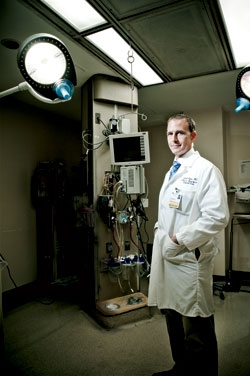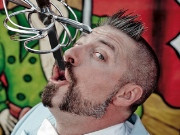
As told to Mary Clare Glover
I was a junior attending physician at Los Angeles County Hospital. A 16-year-old had been visiting his nephew in a bad neighborhood. There was a birthday party, and they were standing outside.
Somebody just walked by and shot my patient—the 16-year-old—as part of a gang initiation. The bullet went through the base of his neck. When he came in, he was in bad shape. All he said was “Please save me.”
I operated for about an hour. He died on the table. And then I went to tell his mother—it was the first time I had to tell somebody her child had died.
The thing about these scenarios is that the parent knows that you know whether or not her kid is alive or dead. And I felt like I wasn’t supposed to say this in the middle of the waiting room. I wanted to have her sitting down and in a private room when I delivered the news. But that meant that, during the really long walk down the hallway, I’m withholding the most important news she’ll ever hear in her life. And I know that she is trying to discern it from my body language. She’s trying to read from the way I walk whether her son is alive. I don’t know whether I should allow that information to show or if it’s better to somehow hide it.
I led her back, and I sat her down and told her. She screamed and said, “Why couldn’t you save my baby? That’s your job!” That’s exactly what I was thinking: Why couldn’t I have saved her son? It’s my job to be able to do that.
She took a swing at me and ripped my shirt. Then she collapsed. I didn’t know what to do. I felt completely, singularly, personally responsible for the death of her child. She was hysterical for so long that I eventually had to tell one of her family members the news. I repeated my name and said that I wanted to answer questions if anybody had them. I said “I’m sorry” again and then walked out.
I take some comfort now in knowing that that’s generally the way it goes, and that doesn’t mean that I’m doing it wrong. There’s no right answer. It’s also gotten harder—much harder—since I had kids. But I’ve also learned not to feel solely responsible for everyone who dies on the operating table. You have to learn to reserve some blame for the person who pulled the trigger.
Jack Sava is director of trauma at Washington Hospital Center. This article appears in the November 2011 issue of The Washingtonian.


















